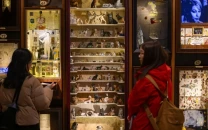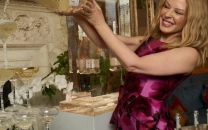Digital debut, human outrage
AI actress Tilly Norwood draws fierce backlash from Hollywood stars

ificial intelligence collided head-on with Hollywood this weekend after the unveiling of Tilly Norwood, the world's first AI actress, at the Zurich Film Festival. The digital performer - designed as a London-based actress with a carefully crafted social media persona - has ignited fierce debate across the entertainment industry, pitting a wave of actor outrage against the ambitions of her creator, Dutch actor, comedian, and technologist Eline van der Velden.
Van der Velden introduced Tilly through her new AI talent studio, Xicoia, a spin-off from her AI production company Particle6. She revealed at the Zurich Summit that talent agencies were already circling the digital creation and that an announcement about formal representation could be expected within months.
"We were in a lot of boardrooms around February, and everyone was like, 'No, this is nothing. It's not going to happen.' Then, by May, people were like, 'We need to do something with you guys,'" she said.
The prospect of a digital actress signing with a real talent agency was enough to spark an immediate and visceral backlash from actors and audiences alike. Social media filled with angry posts, parody accounts, and accusations that Norwood's very existence threatened human performers.
Several high-profile Hollywood names joined the chorus of critics, suggesting that outrage should be directed not just at the technology but at whichever agent dared to put pen to paper.
"How gross, read the room," wrote Scream star Melissa Barrera on Instagram. Actress Kiersey Clemons added: "Out the agents. I want names." Mara Wilson, best known for 'Matilda', pointedly asked: "And what about the hundreds of living young women whose faces were composited together to make her? You couldn't hire any of them?"
Toni Collette responded with a series of screaming emojis, while Lukas Gage added tongue-in-cheek humour by joking that Norwood was "a nightmare to work with" because she "couldn't hit her mark and was late."
The uproar prompted Van der Velden to issue a public statement on Instagram, also posted to Norwood's own account. "To those who have expressed anger over the creation of my AI character, Tilly Norwood, she is not a replacement for a human being, but a creative work – a piece of art. Like many forms of art before her, she sparks conversation, and that in itself shows the power of creativity," she wrote.
Van der Velden compared AI to earlier innovations such as animation, puppetry, and CGI, which expanded storytelling without erasing live acting. "I see AI not as a replacement for people, but as a new tool, a new paintbrush," she added. "I'm an actor myself, and nothing – certainly not an AI character – can take away the craft or joy of human performance." She emphasised that creating Tilly was "an act of imagination and craftsmanship," not an attempt to substitute machines for people.
Despite the assurances, industry unease remains raw. The debate over artificial performers echoes the concerns that dominated the 2023 Hollywood strikes, where writers and actors united to limit AI's role in scripting and replicating performances.
For many, Norwood's emergence confirms their worst fears that AI is not just nibbling around the edges of entertainment but moving directly into roles once exclusively human.
Norwood is presented as more than a proof of concept. She already has a growing online following and has announced her first acting role in AI Commissioner, a sitcom exploring the future of television.
Van der Velden has spoken of her ambition for Norwood "to be the next Scarlett Johansson or Natalie Portman." According to reports, Tilly was constructed using 10 different AI tools, including ChatGPT, to enable her to "perform with nuance, emotion, and consistency."
Still, questions swirl about what it means to market an AI creation as an actress rather than simply as an animated character. Some critics argue that if Norwood's face was derived from composites of real women, the ethical concerns go deeper than contracts and agents. Others worry about what her existence might mean for young performers already struggling to break into a saturated industry.
Yet not all reaction has been hostile. Alongside the backlash, there has been curiosity and guarded support for experimentation. Some in the industry see AI characters as an extension of the entertainment tradition of testing new forms - from cartoons to computer-generated imagery. "When we celebrate all forms of creativity, we open doors to new voices, new stories, and new ways of connecting with each other," Van der Velden argued.
Tilly's development has been framed as both an artistic project and a business proposition. Van der Velden recounted how initial scepticism from executives quickly shifted to interest once the possibilities became clear. "When we first launched Tilly, people said, 'What's that?' and now we will announce which agency will manage its activities in the next few months," she told Deadline.
Still, the uproar underscores how fragile Hollywood's relationship with AI remains. After years of battles over streaming, pay scales, and residuals, actors now face the prospect of competing with digital creations for attention, roles, and resources. For performers like Barrera and Clemons, the outrage stems not from fear of technology itself but from an industry all too willing to prioritise novelty over people.
Van der Velden insists such fears are misplaced. "Nothing – certainly not an AI character – can take away the craft or joy of human performance," she reiterated. "AI offers another way to imagine and build stories." Whether Hollywood believes her is another matter.
For now, Norwood remains both a curiosity and a flashpoint. She has not yet signed with an agent, nor has her sitcom set a release date. But the debate she has ignited suggests her future may matter less than the questions she forces the industry to confront. Is she a gimmick destined for a few headlines, or a harbinger of an entertainment landscape where human actors share the stage with artificial peers?
In Zurich, Van der Velden seemed undeterred by the storm. "We wanted to show that AI can be more than a tool in the background. It can be a character, a performer, a collaborator," she said. Whether that vision excites or terrifies may depend on where one sits in the business. But with agents circling and social media buzzing, one thing is clear: Tilly Norwood has already secured her first starring role - as the lightning rod for Hollywood's latest existential debate.




















COMMENTS
Comments are moderated and generally will be posted if they are on-topic and not abusive.
For more information, please see our Comments FAQ